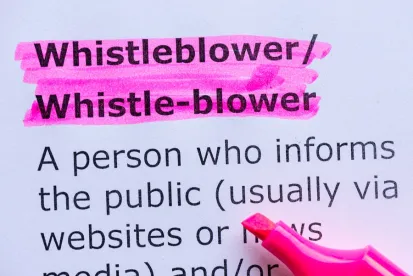A whistleblower is not a whistleblower unless he reports suspected securities law violations to the SEC. And, if the whistleblower does not report suspected misconduct to the SEC, the whistleblower is not protected against retaliation by the employer. So said the Supreme Court on February 21, 2018, in Digital Realty Trust, Inc. v. Somers; the Supreme Court ruled that the Dodd-Frank Act’s whistleblower anti-retaliation provisions apply only to individuals who have reported possible securities law violations to the U.S. Securities and Exchange Commission (“SEC”).1
The Dodd-Frank Act created new financial incentives for whistleblowers who provide the SEC with original information about possible securities law violations, as well as enhanced protections from retaliation. Among these protections, the Dodd-Frank Act expressly prohibits an employer from retaliating against a whistleblower and provides a private cause of action for an individual to bring a lawsuit for retaliation against his or her employer. 2 Although the statute defines the term “whistleblower” to mean an individual who provides information relating to securities law violations to the SEC,3 the SEC took the position in its final rulemaking that the anti-retaliation provision also protects individuals who report to persons or governmental authorities other than the SEC.4
Since then, a federal circuit split developed: the Second and Ninth Circuits accepted the SEC’s position—applying the anti-retaliation provision to employees who reported possible securities violations internally but never to the SEC5—while the Fifth Circuit held that the provision protected only those who report possible violations to the SEC.6 The Supreme Court resolved this split in its unanimous decision in Digital Realty, whereby it agreed with the Fifth Circuit and disagreed with the SEC. In the opinion, written by Justice Ginsberg, the Court relied on what it found to be clear statutory language, and held that the Dodd-Frank Act’s anti-retaliation provision does not extend to individuals who have not reported securities law violations to the SEC.
The Court’s ruling that internal whistleblowers are not afforded anti-retaliation protection under the Dodd-Frank Act may be a victory for employers facing anti-retaliation claims by internal whistleblowers, but the practical effect of this ruling may be the exact opposite for most companies. A large majority of the individuals who have received whistleblower awards from the SEC, to date, first reported their concerns internally. By reporting internally before approaching the SEC, employers have the opportunity to investigate the claims first, assess their legitimacy, and take pro-active remedial action where necessary—possibly even making self-disclosures to the SEC. However, the Court’s ruling instead incentivizes employees to go directly to the SEC.
In recent years, many companies have rewritten their compliance programs to address whistleblower issues in a fair and legal manner that encourages internal reporting. A comprehensive internal reporting mechanism benefitted both the company, which had the advantage of a first look at the violation and an attempt to remedy, if necessary, and the SEC, which was not forced to act as the sole investigator of every single perceived violation.
Unless Congress intervenes, the Court’s decision will likely undermine these benefits. Given the SEC’s belief that its whistleblower program has proven to be a “game-changer,”7it would not be surprising to see a push for Congress to amend the language of the statute to change the definition of “whistleblower” to include individuals who only report potential violations to their employers.
For more information on this subject please see the following articles by Cadwalader partners: SEC Enforcement Under the Trump Administration or 2017 Securities Year in Review.
1 Digital Realty Trust, Inc. v. Somers, ––– U.S. –––, (U.S. Feb. 21, 2018) (No. 16-1276).
2 15 U.S.C. § 78u-6(h)(1).
3 § 78u-6(a)(6).
4 Implementation of the Whistleblower Provisions of Section 21F of the Securities Exchange Act of 1934, Release No. 34-64545, at 17 (Aug. 12, 2011).
5 Berman v. Neo@Ogilvy LLC, 801 F.3d 145 (2d Cir. 2015); Somers v. Digital Realty Tr. Inc., 850 F.3d 1045 (9th Cir. 2017).
6 Asadi v. G.E. Energy (USA), LLC, 720 F.3d 620 (5th Cir. 2013). See also Martensen v. Chicago Stock Exchange, Case No. 17-cv-1494 (N.D. Ill. 2017), aff’d Case No. 17-2660 (7th Cir. Feb. 20, 2018) (Easterbrook, J.).
7 See SEC Press Release No. 2016-173, “SEC Whistleblower Program surpasses $100 Million in Awards,” available online at https://www.sec.gov/news/pressrelease/2016-173.html.







 />i
/>i
